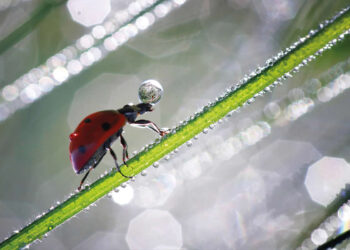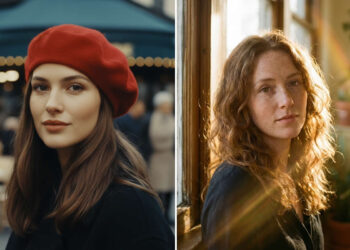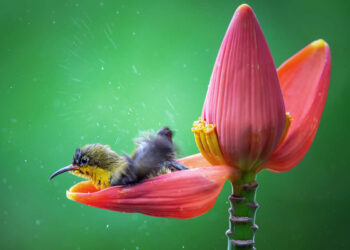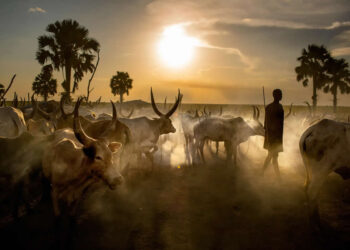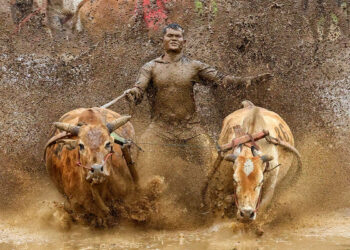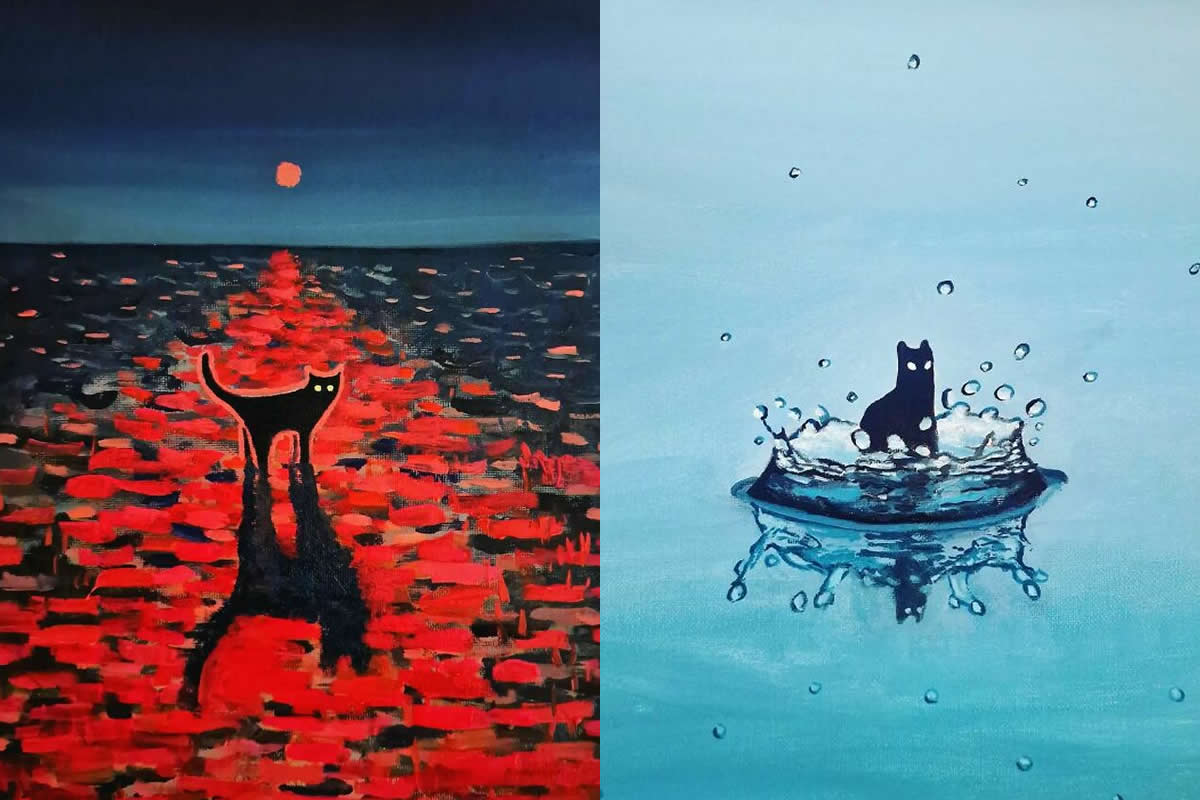Every year, nature lovers and photography buffs wait for this moment — and it’s finally here. The Natural History Museum in London has unveiled the 2025 Wildlife Photographer of the Year winners, and these images are straight-up jaw-dropping. Chosen from over 60,600 entries from 113 countries, this year’s winners capture the raw beauty, emotion, and wild unpredictability of life on Earth.
Spread across 19 categories, the photos go way beyond cute animal portraits. They tell stories — of survival, connection, and the delicate balance between humans and nature. One image shows a hyena reclaiming an abandoned mining town, another captures a baby giant anteater being lovingly nursed back to health at a rescue center. Each frame feels like a reminder that the wild world doesn’t exist apart from us — we’re part of its heartbeat.
From icy Arctic landscapes to dense tropical jungles, these photos spotlight the planet’s incredible biodiversity and the artists brave enough to capture it. The Wildlife Photographer of the Year competition has always been more than a contest — it’s a celebration of storytelling through the lens, a wake-up call to protect what’s still untamed.
If these 20 winners have you mesmerized, don’t miss the highly commended collection released earlier this year — a sneak peek into nature’s most breathtaking moments. Together, they prove that while technology can capture detail, it’s the human eye — and heart — that gives it soul.
Scroll down and inspire yourself. You can check their website for more information.
You can find more info:
#1. Winner – Wildlife Photographer of the Year: "Ghost Town Visitor" by Wim van den Heever
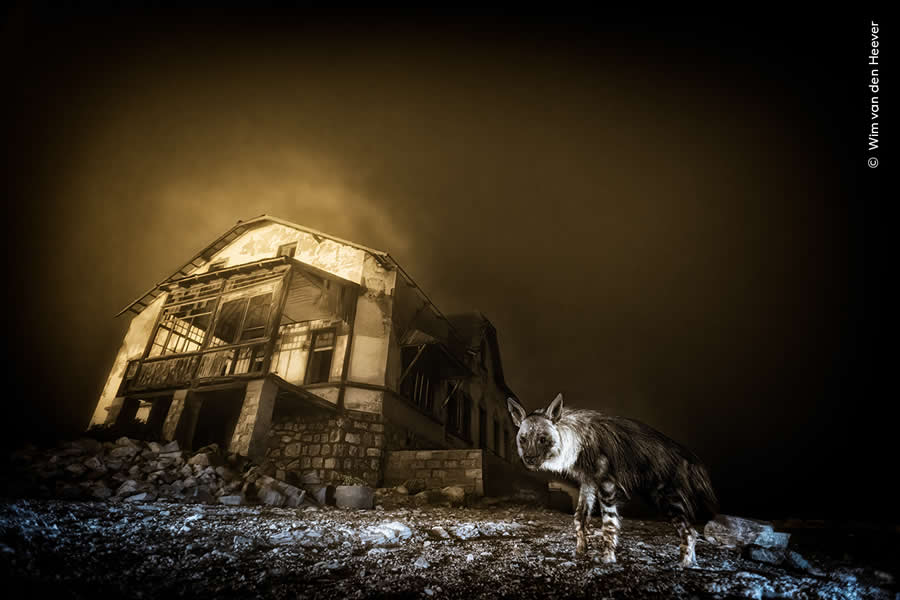
"Wim van den Heever (South Africa) photographs this haunting scene of a brown hyena among the skeletal remains of a long-abandoned diamond mining town.
With sea fog rolling in from the Atlantic Ocean, Wim chose this spot for his camera trap after noticing hyena tracks nearby. ‘It took me 10 years to finally get this one single image of a brown hyena, in the most perfect frame imaginable.’
The rarest hyena species in the world, brown hyenas are nocturnal and mostly solitary. They are known to pass through Kolmanskop on their way to hunt Cape fur seal pups or scavenge for carrion washed ashore along the Namib Desert coast."
#2. Winner – Young Wildlife Photographer of the Year 15 – 17 Years: "After the Destruction" by Andrea Dominizi
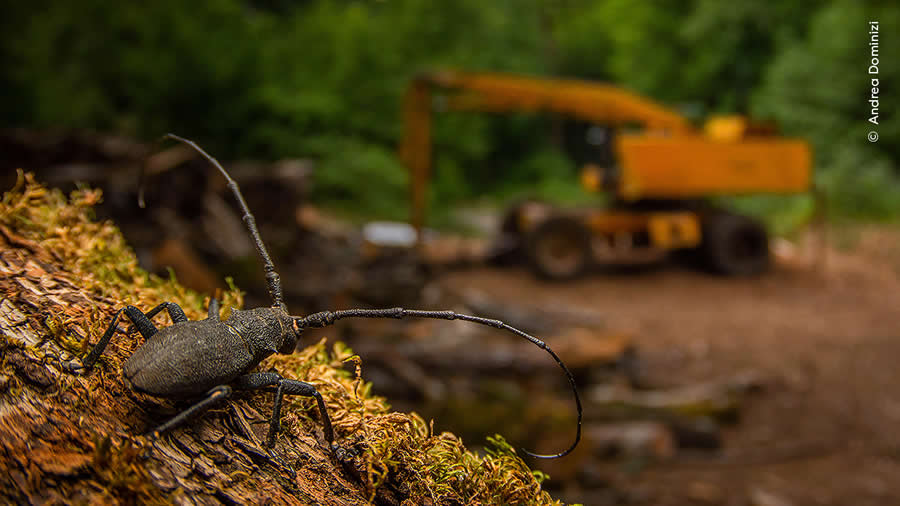
"Andrea Dominizi (Italy) finds a longhorn beetle – a forest sentinel observing an intruder.
Andrea noticed this longhorn beetle while walking in the Lepini Mountains of central Italy, in an area once logged for old beech trees. Using a wide-angle lens and off-camera flash, he framed the beetle against abandoned machinery.
Andrea’s photograph tells a poignant story of habitat loss. As longhorn beetles tunnel into dead wood, fungi make their way inside, helping to break it down and recycle nutrients. If the beetles’ habitat is disturbed or destroyed, the effects ripple across the entire ecosystem."
#3. Winner – Impact Award: "Orphan of the Road" by Fernando Faciole
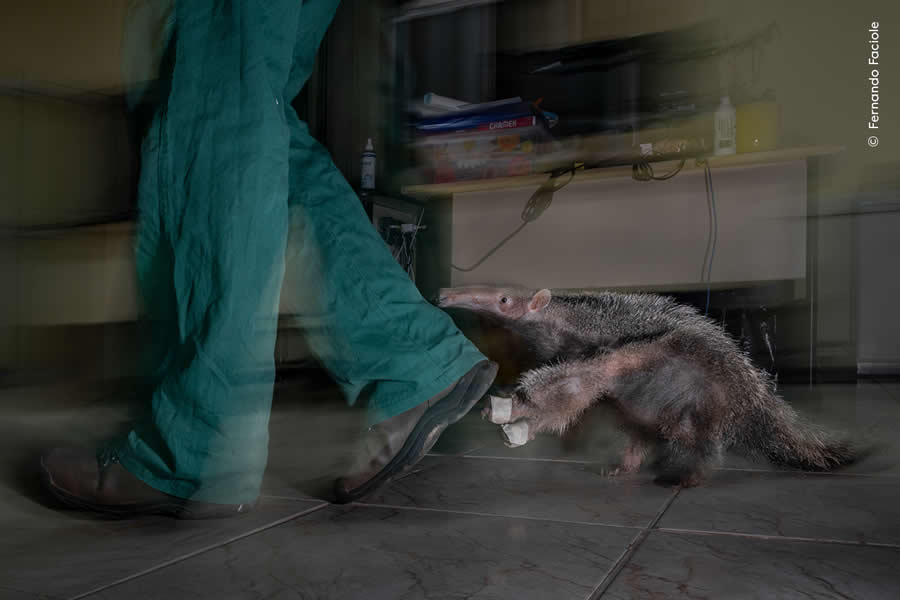
"Fernando Faciole (Brazil) watches an orphaned giant anteater pup follow its caregiver after an evening feed at a rehabilitation centre.
Fernando wanted to highlight the consequences of road collisions, a leading cause of the decline in giant anteater numbers in Brazil. This pup’s mother was killed by a vehicle, and the hope is that it will be released back into the wild after being encouraged to develop crucial survival skills by its caregiver."
#4. Winner – Animals in their Environment: "Like an Eel out of Water" by Shane Gross
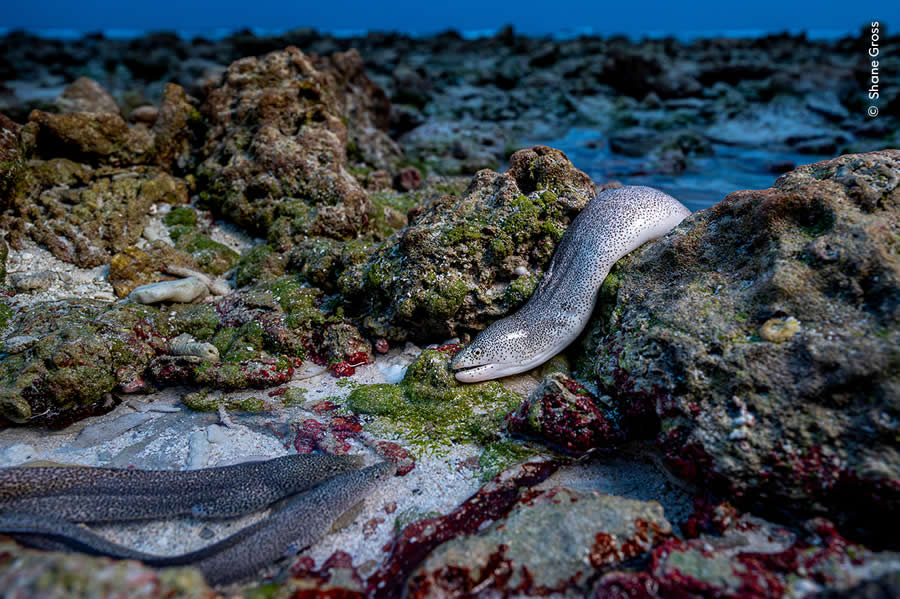
"Shane Gross (Canada) witnesses a peppered moray eel very much in its element hunting for carrion at low tide.
It took Shane numerous attempts over several weeks to document this rarely photographed behaviour. At first the eels were elusive, but once Shane realised that they were scavenging for dead fish, he waited. His patience was soon rewarded when these three eels appeared."
#5. Winner – Behaviour, Mammals: "Cat Amongst the Flamingos" by Dennis Stogsdill
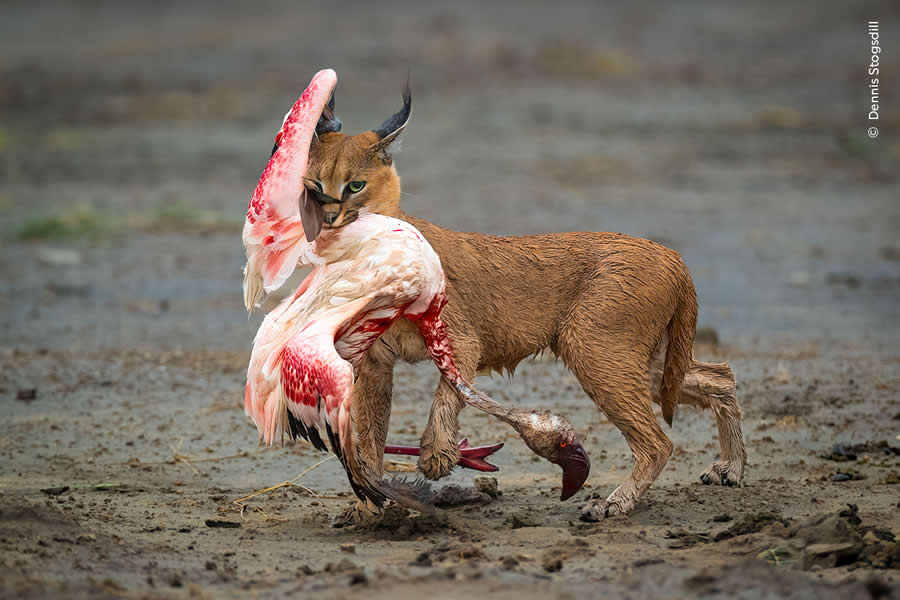
"Dennis Stogsdill (USA) witnesses a caracal hunting a lesser flamingo in the Serengeti National Park, Tanzania.
Dennis had been keeping an eye out for wild cats such as servals for several days when a call came over the radio: one had been seen at Ndutu Lake. But it wasn’t a serval. It was a caracal, successfully hunting wading lesser flamingos."
#6. Winner – Animal Portraits: "Shadow Hunter" by Philipp Egger
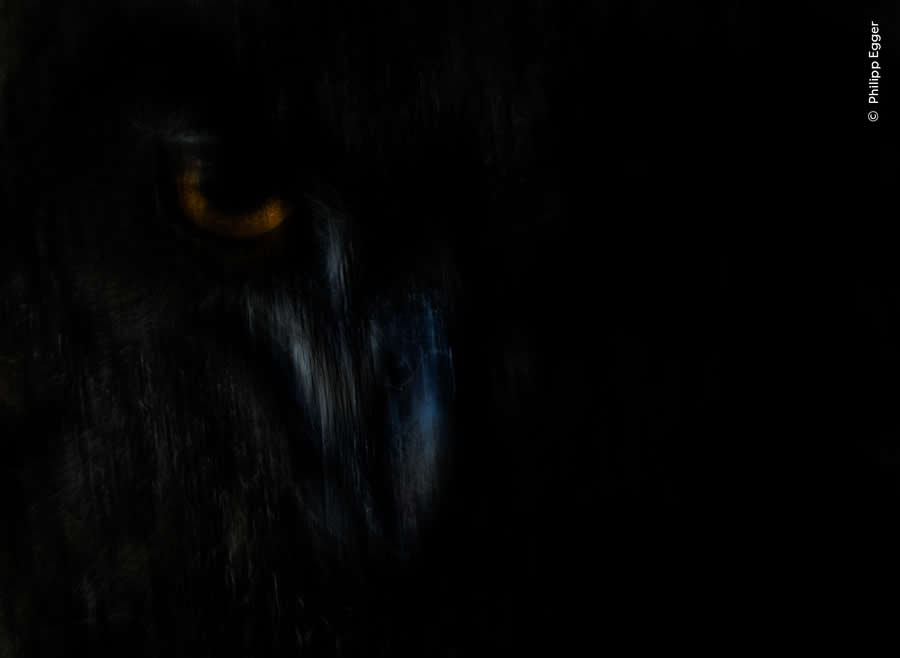
"Philipp Egger’s (Italy) patience is rewarded with the orange glint of an eagle owl’s eyes and the evening light falling on its feathers.
Philipp first saw this nest while climbing and spent four years observing it from a distance. He planned this image meticulously, right down to the slight camera wobble to blur the few elements present, using a telephoto lens."
#7. Winner – Behaviour, Amphibians and Reptiles: "Frolicking Frogs" by Quentin Martinez, France
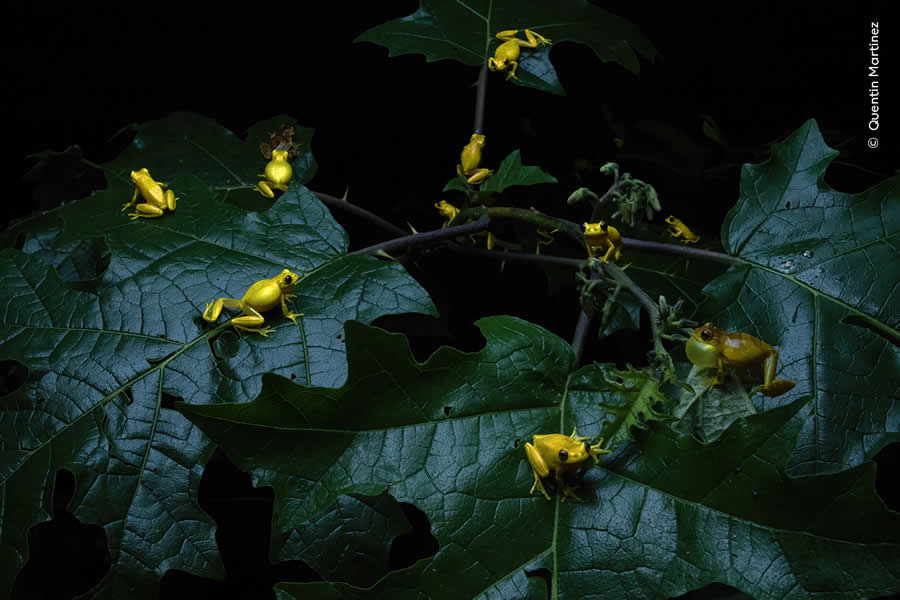
"Quentin Martinez (France) discovers a gathering of lesser tree frogs in a breeding event.
In persistent rain, Quentin followed a flooded path to a temporary pool in a forest clearing. He framed this scene with a wide-angle lens and used a diffused flash, which didn’t disturb the frogs, to highlight their metallic sheen."
#8. Winner – Behaviour, Birds: "Synchronised Fishing" by Qingrong Yang
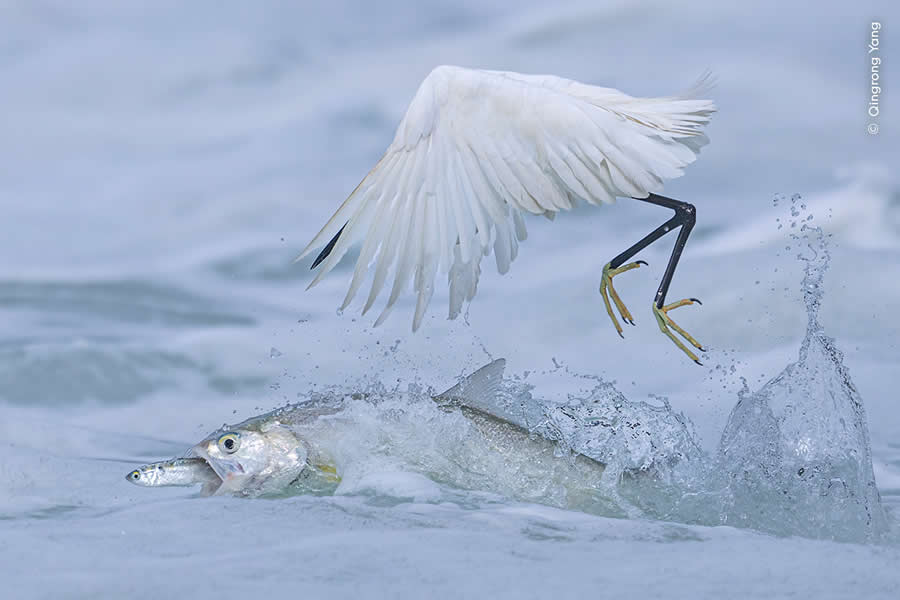
"Qingrong Yang (China) perfects photographic timing to show a ladyfish snatching its prey from right under this little egret’s beak.
Qingrong was at Yundang Lake near his home, a place he visits regularly to photograph the feeding frenzies: little egrets patrol the surface, ready to pounce on fish leaping to escape underwater predators."
#9. Winner – Behaviour, Invertebrates: "Mad Hatterpillar" by Georgina Steytler
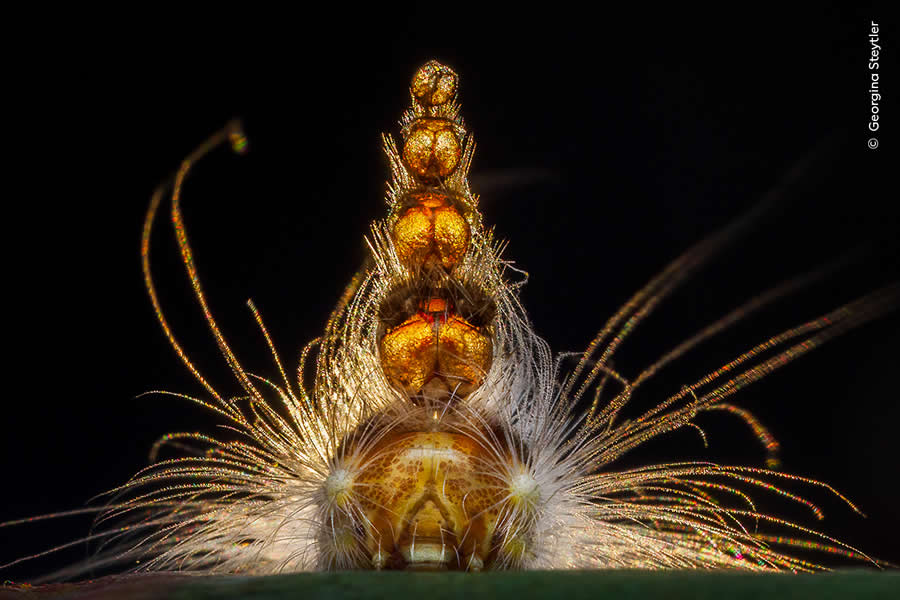
"Georgina Steytler (Australia) showcases the strange headgear of a gum-leaf skeletoniser caterpillar.
Georgina had been looking out for this caterpillar for years when she noticed eucalyptus trees bearing skeletonised leaves, telltale signs that the animal had been grazing. She took this image backlit by the setting sun, using a fill-in flash to illuminate the living head at the base of the stack."
#10. Winner – Oceans, The Bigger Picture: "The Feast" by Audun Rikardsen
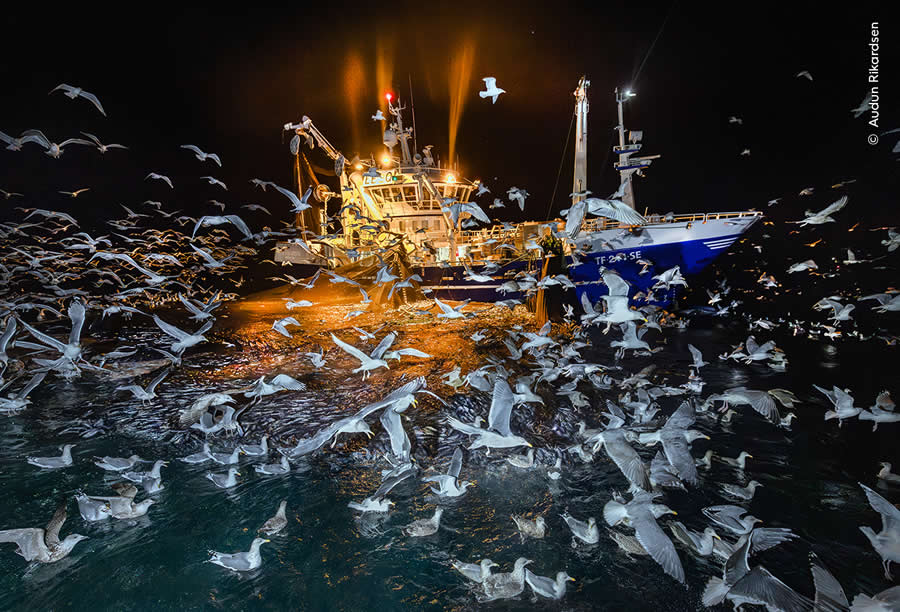
"Audun Rikardsen (Norway) witnesses feeding time around an Atlantic fishing vessel during a polar night in northern Norway.
Audun managed to photograph this chaotic scene of gulls attempting to catch fish trapped by nets. The gulls have learnt to follow the sound of the boats to find a herring feast. Through his work, Audun aims to draw attention to the ongoing conflict between seabirds and the fishing industry."
#11. Winner – 10 Years and Under: "The Weaver’s Lair" by Jamie Smart
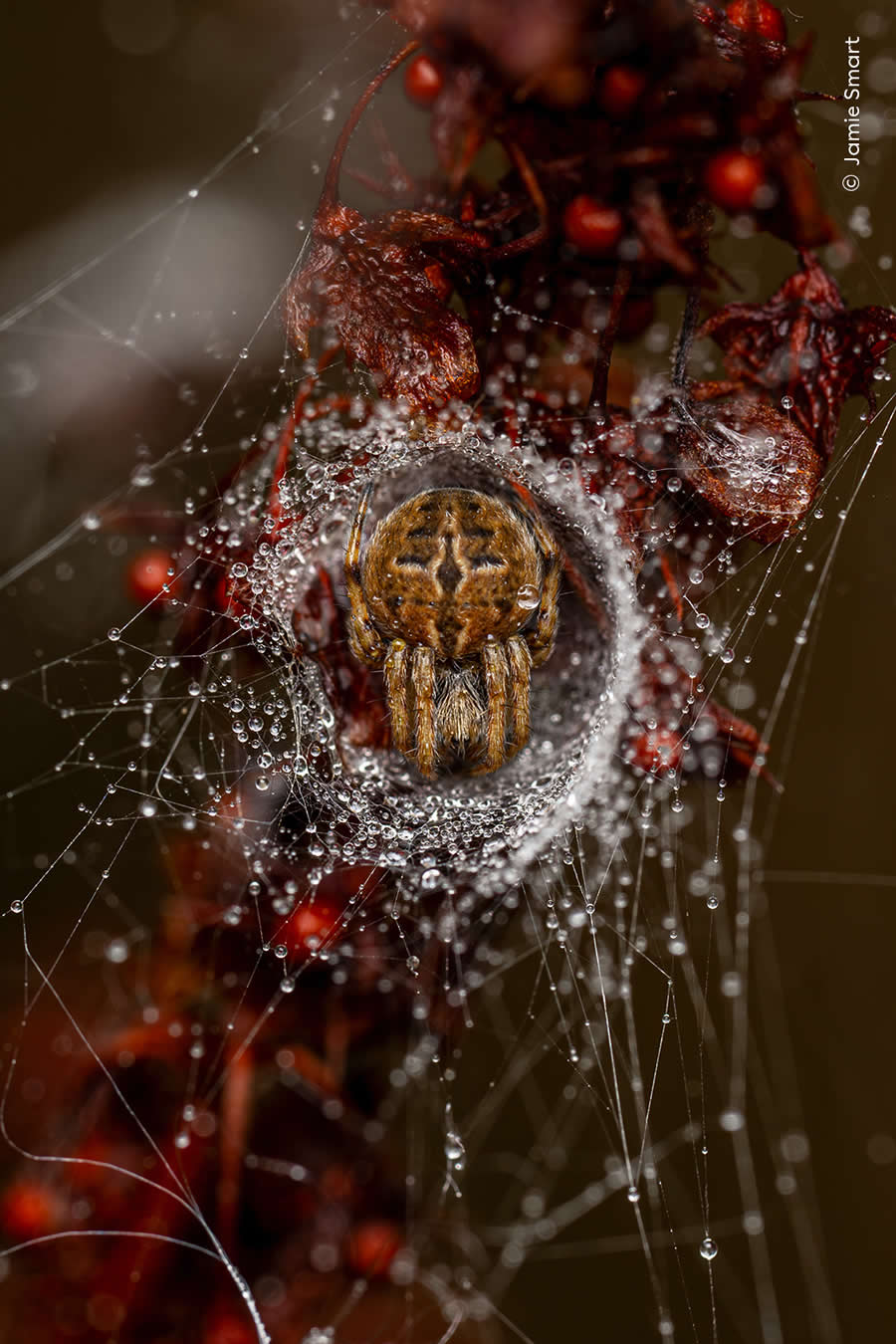
"Jamie Smart (UK) spots an orb weaver spider inside its silken retreat on a cold September morning.
Jamie first noticed the dew-laden web before realising its maker was sitting in a nest. With the patience and steadiness needed to manually focus her camera, she kept the spider perfectly lit and symmetrically framed."
#12. Winner – 11–14 Years: "Alpine Dawn" by Lubin Godin
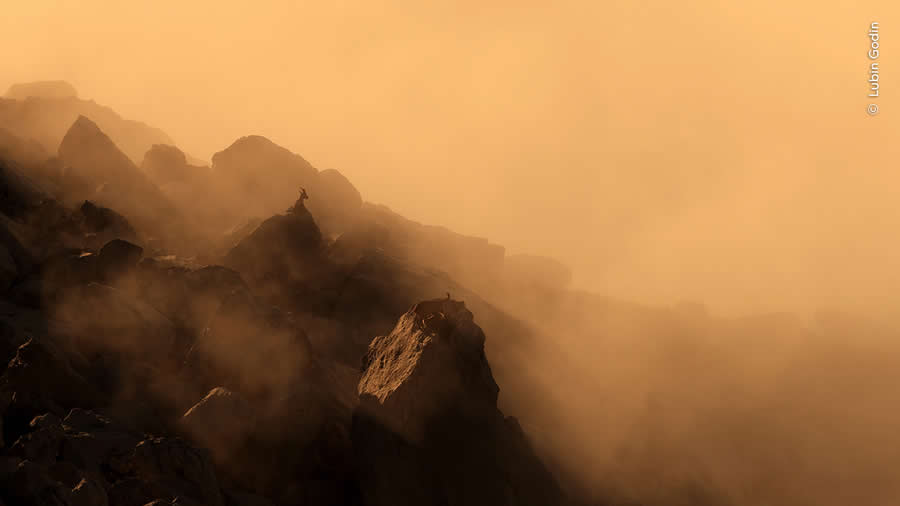
"Lubin Godin (France) finds himself in mist-shrouded mountains with silhouetted ibex.
Lubin spotted the Alpine ibex resting above a sea of clouds during an early morning ascent. As the mist rose and the sun broke over the crags, he retraced his steps to capture this ethereal moment before fog thickened and the light faded."
#13. Winner – Underwater: "Survival Purse" by Ralph Pace
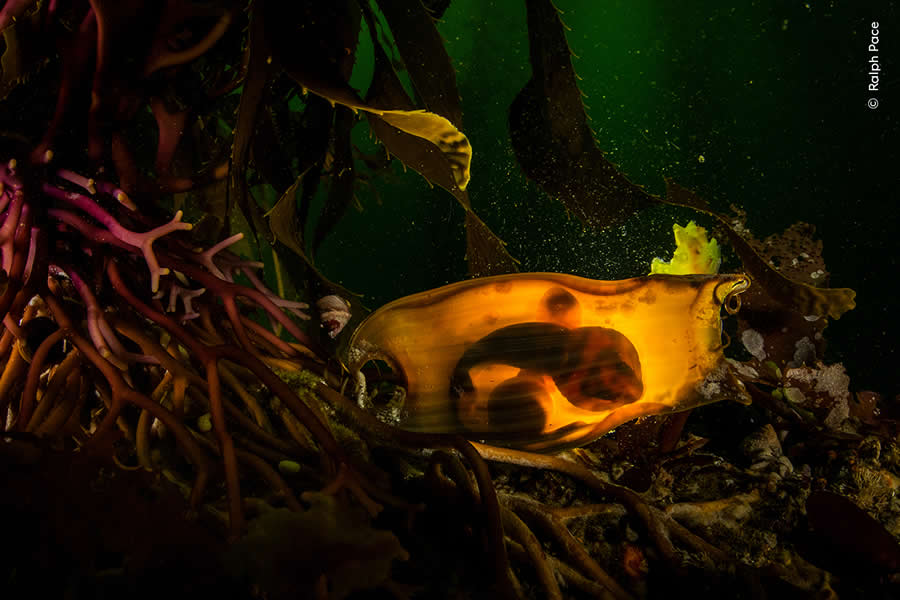
"Ralph Pace (USA) beautifully illuminates the egg case of a swell shark, tethered to the base of a giant kelp.
Faced with strong currents pushing him from side to side, Ralph struggled to keep steady to photograph this egg case, or ‘mermaid’s purse’. He lit the case from behind to reveal the swell shark embryo within, its gill slits and yolk sac clearly visible among the dark kelp forest."
#14. Winner – Natural Artistry: "Caught in the Headlights" by Simone Baumeister
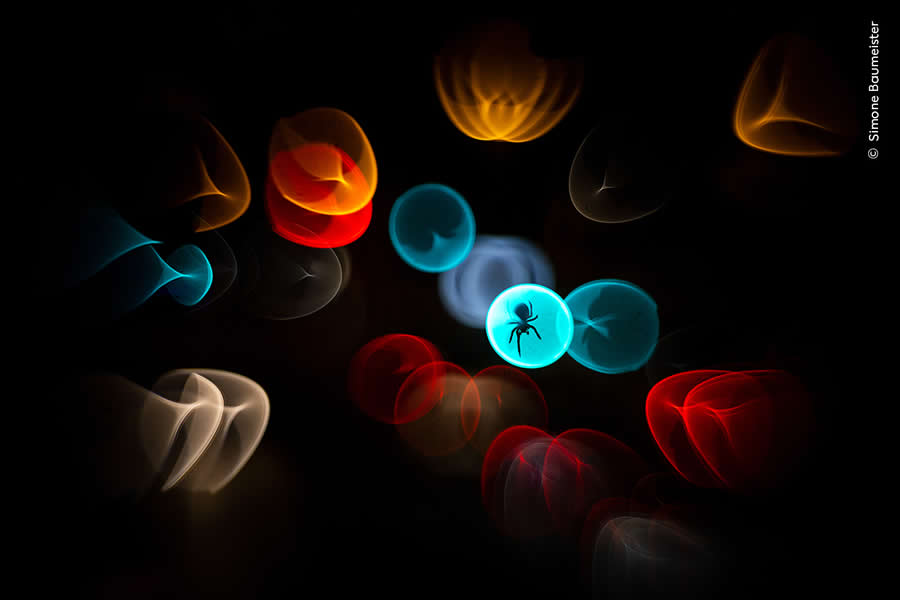
"Simone Baumeister (Germany) shows an orb weaver spider on its web on a pedestrian bridge, silhouetted by lights from the cars below.
To achieve this kaleidoscopic effect, Simone reversed one of the six glass elements in an analogue lens. This distorted the image at the edges while leaving the centre sharply focused. She then cropped the picture to move the spider slightly off-centre."
#15. Winner – Plants and Fungi: "Deadly Allure" by Chien Lee
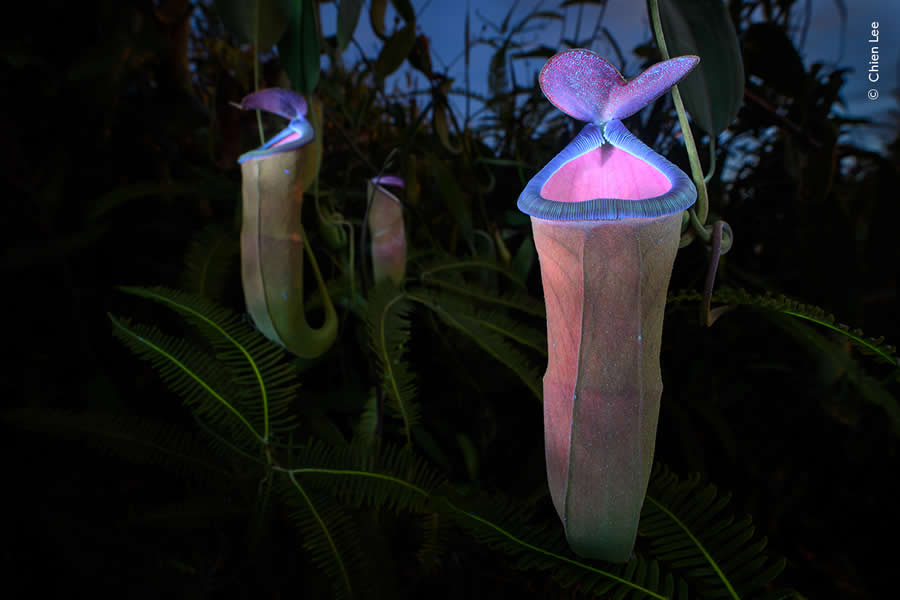
"Chien Lee (Malaysia) uses a UV torch to reveal the fluorescent world of an insect-attracting pitcher plant.
Insects can see ultraviolet (UV) light, but humans can’t, so Chien used a long exposure and a UV torch. Waiting until after sunset, he had just a five-minute window before the ambient light illuminating the backdrop disappeared completely."
#16. Winner – Wetlands, The Bigger Picture: "Vanishing Pond" by Sebastian Frölich
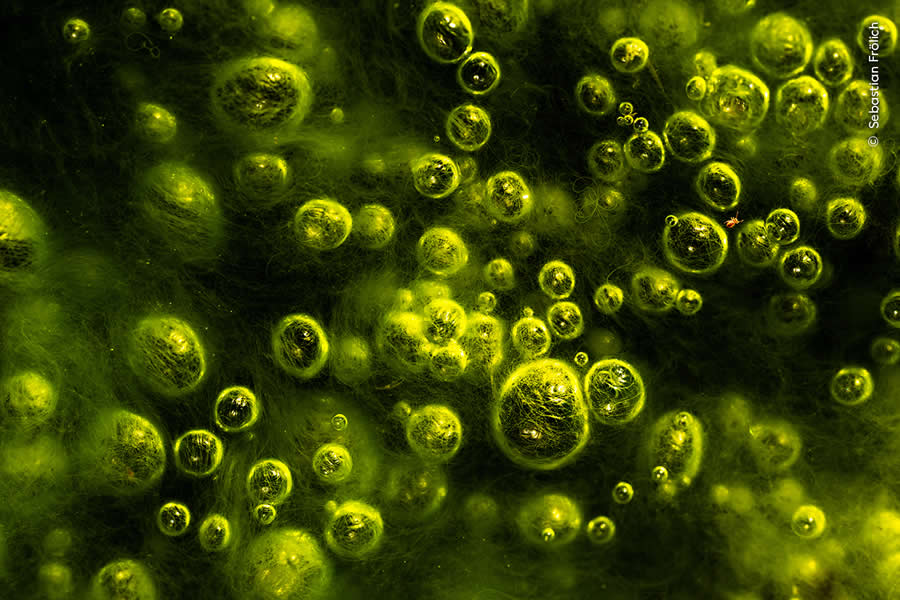
"Sebastian Frölich (Germany) finds a springtail among a galaxy of neon green gas bubbles in Austrian moorlands.
Sebastian visited this fragile wetland ecosystem to highlight its importance as a vast store of carbon dioxide and as a habitat for diverse wildlife. A tiny springtail ran across escaping gas bubbles rising through the algae, giving this image a sense of scale."
#17. Winner – Photojournalism: "How to Save a Species" by Jon A Juárez
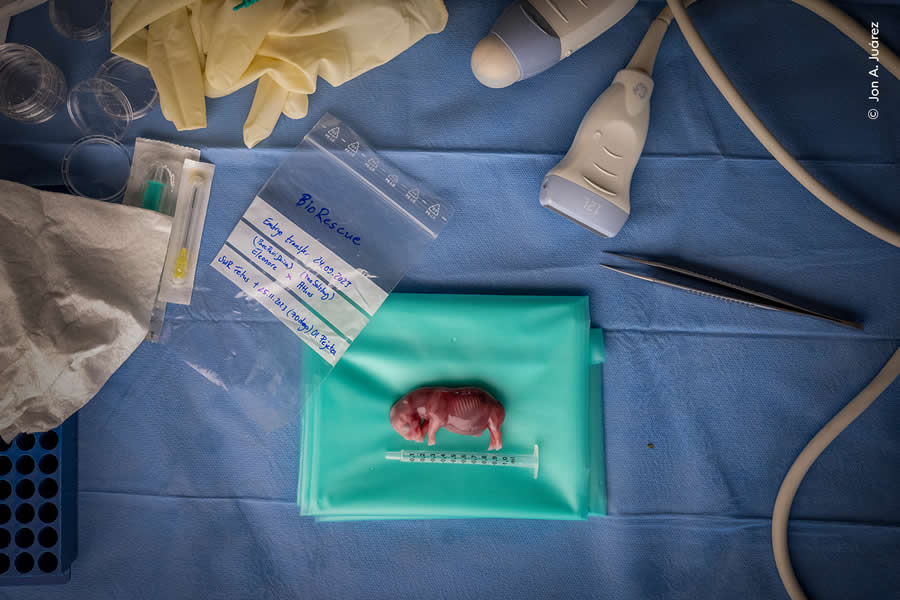
"Jon A Juárez (Spain) documents the groundbreaking science to save the northern white rhino from extinction through in vitro fertilisation (IVF).
Jon spent years documenting the work of the BioRescue Project, and says that witnessing a milestone in saving a species ‘was something I will never forget’."
#18. Winner – Photojournalist Story Award: "Seething Pit" by Javier Aznar González de Rueda
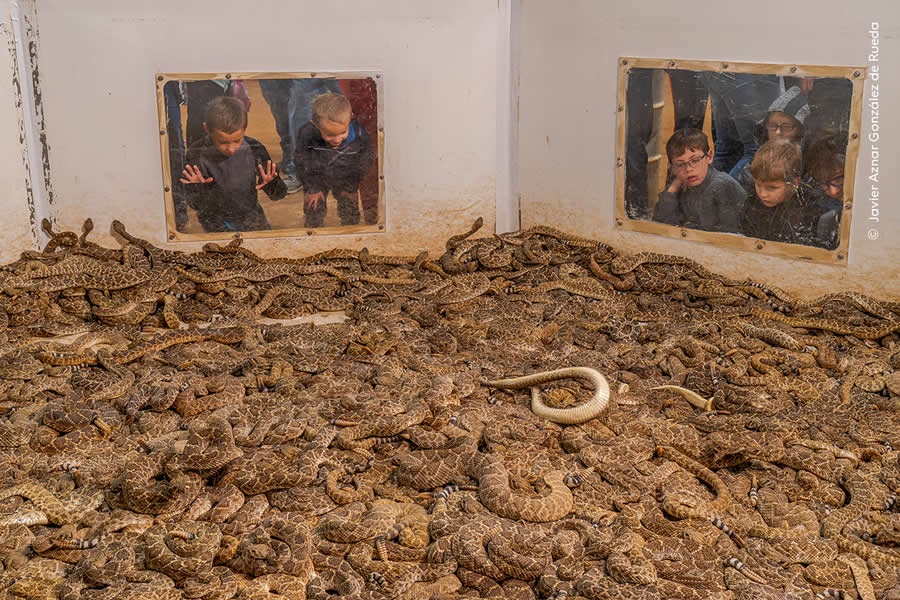
"Visitors gaze at hundreds of western diamondback rattlesnakes at the annual rattlesnake round-up in Sweetwater, Texas. Many of these snakes will be killed and sold for their skin and meat. Round-ups can harm other animals too: snakes are often driven from their rock shelters using petrol fumes, which also affect any creatures sheltering alongside them."
#19. Winner – Rising Star Award: "Sole Survivor" by Luca Lorenz, Germany
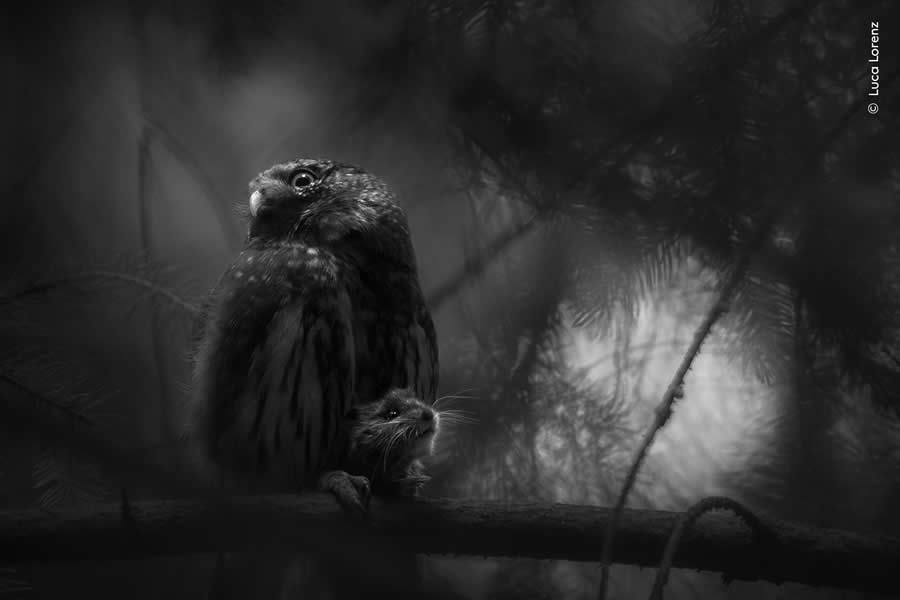
"Luca had been watching a tree hole where this Eurasian pygmy owl and its mate were nesting. When one disappeared, the other continued feeding the chicks. On this day, the remaining bird returned clutching the chicks’ breakfast in its claws, and called for its mate, but there was no reply."
#20. Winner – Portfolio Award for Visions of the North: "Taiga Tapestry" by Alexey Kharitonov
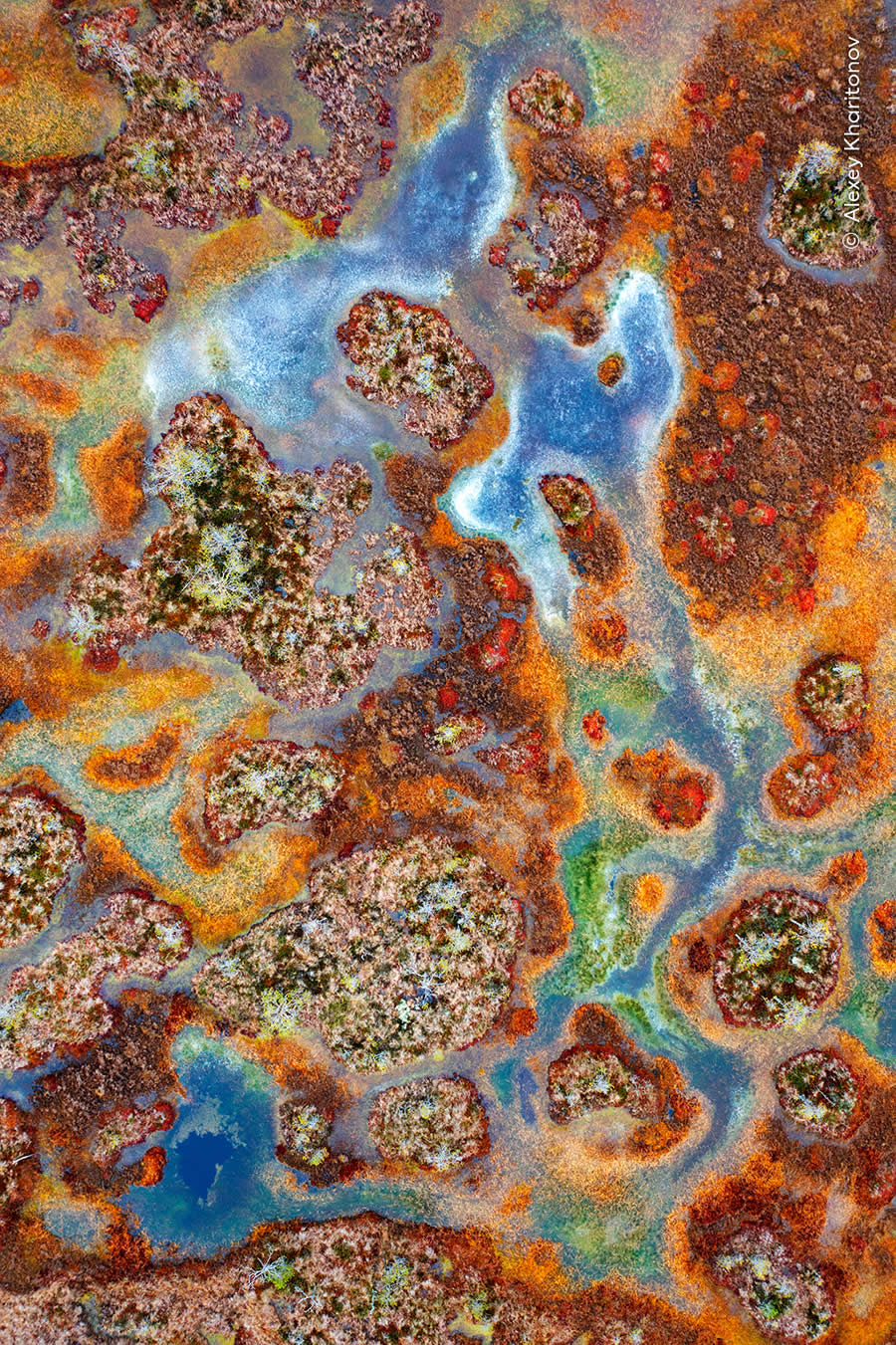
"A kaleidoscope of colours carpets Mukhinskoye Swamp under a grey sky. Blue lakes and channels fringed with white ice contrast with green and yellow grasses and widespread sphagnum mosses, which turn vibrant orange and red during the brief autumn."


